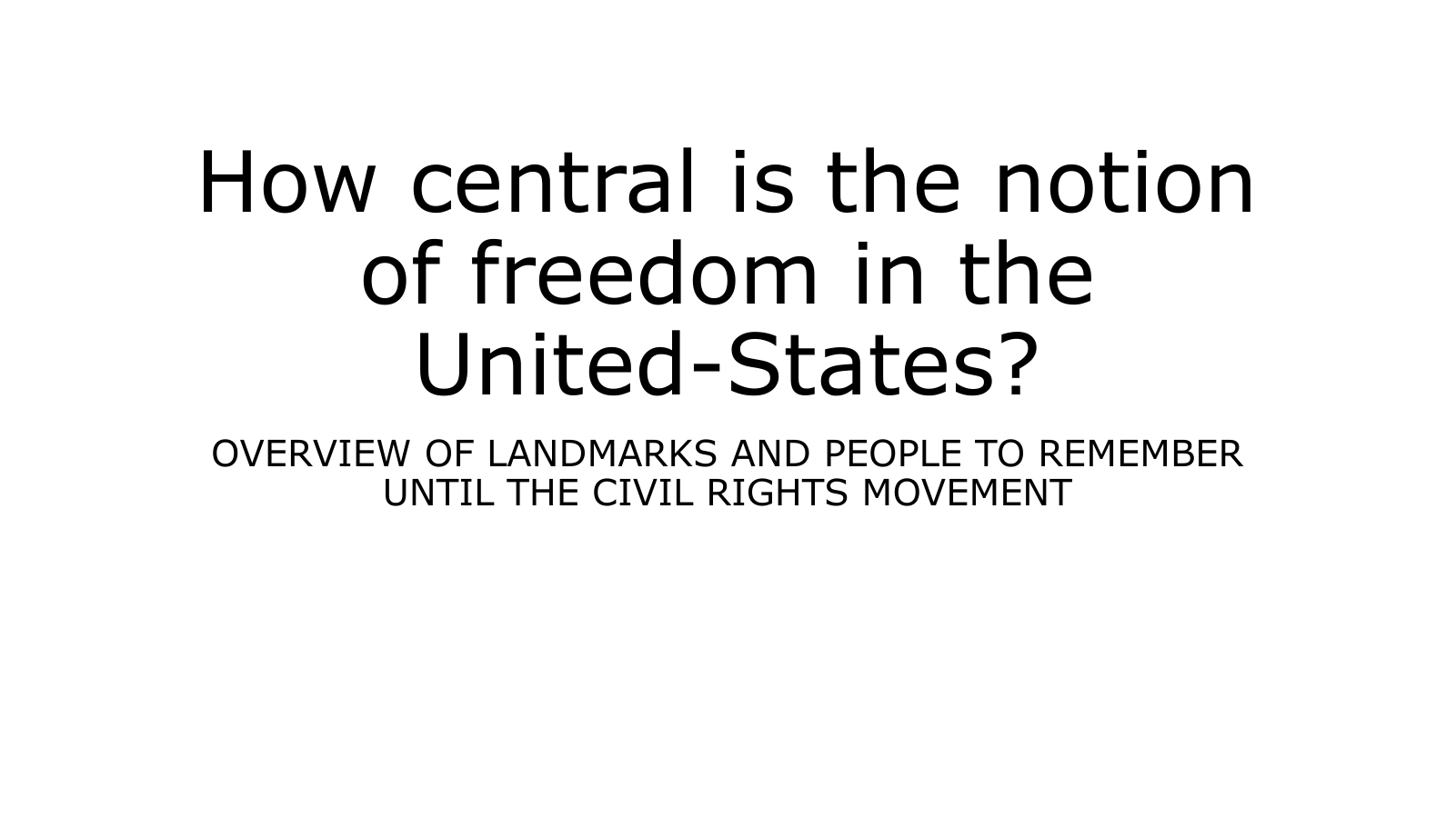How central is the notion of freedom in the United-States?
Publié le 21/11/2022

Extrait du document
«
How central is the notion
of freedom in the
United-States?
OVERVIEW OF LANDMARKS AND PEOPLE TO REMEMBER
UNTIL THE CIVIL RIGHTS MOVEMENT
XVIIth century
settlement in
North America
• English people, but also
Dutch, Spanish, French
emigrated to America
where they settled in
the first 13 colonies.
• Some of the settlers
fled Europe to seek
religious freedom,
others to seek
economic prosperity.
America was seen as
the “promised land”.
1620 – The
Pilgrim
Fathers
In September 1620, 100 English
passengers set sail from
Plymouth on board the
Mayflower.
40 of these
passengers were Protestant
separatists looking for religious
freedom.
They are remembered
as The Pilgrim Fathers.
Towards
The War of
Independen
ce/America
n
Revolutiona
ry War
• Although the settlers were granted religious freedom, they
were still under British rule.
They paid taxes to the English
government even though they had no representatives in the
British Parliament.
• The settlers felt more and more resentful not only because
they had to buy goods from the British but also because
they had to pay tax on those goods.
• The Boston Tea Party is the name given to a political
protest which took place on December 16, 1773.
“American
colonists, frustrated and angry at Britain for imposing
“taxation without representation,” dumped 342 chests of tea
into the harbour.
This act of defiance rallied American
patriots across the 13 colonies to fight for Independence.
• All those tensions led to the Revolutionary War 1775-1783
• On July 4th 1776, the Declaration of Independence was
adopted by the delegates from the 13 colonies.
Land of freedom, early paradoxes
• First Nations Americans / Native American had to relinquish / abandon
their territories.
Many were massacred.
• Slavery: As the southern states depended mainly on tobacco and
cotton plantations, they needed labour force and thus used slaves
brought from Africa.
• The only people who could vote were white men who owned property.
The road to freedom, a long & winding
road
• President Andrew Jackson’s new
democracy: Profound social and
economic changes in the 19th century led
President Jackson to believe that power
should not solely be in the hands of a
small minority of “aristocrats” and
landowners.
• The Jacksonian policy allowed “The
Common Man” to vote: most white men
over the age of 21 were allowed to vote.
• However, while white men were given
more rights, black Americans and native
Americans saw their rights regress.
President from1829 to1837
Abraham Lincoln and the American Civil War
A divided Nation
The Civil War, 1861-1865
• In the USA, the 19th century was an
era of tremendous growth with
widening differences between the
North and the South.
• The Civil war began in 1861 after
decades of tension between the
northern and the southern states
over slavery.
• While the North mainly relied on
manufacturing, industry and small
farms, the South relied on large
cotton and tobacco plantations which
depended on the labour of enslaved
black people.
• Abraham Lincoln’s main reason for
waging war was to preserve the
union of the United States and then
to end slavery.
• By 1861, a year after Abraham Lincoln
was elected president, the South had
seceded from the North and become a
Confederation of states which feared
losing their economic model.
• Slavery was abolished in 1865
• Abraham Lincoln was assassinated
the same year while attending a
play.
From the end of slavery to the
fight for Civil Rights
• Jim Crow Laws: Just after the
ratification of the 13th amendment
abolishing slavery, the Jim Crow laws
were voted in many southern states.
They
legalised racial segregation.
• KU Klux Klan: After the war,violence was
on the rise, making danger a regular aspect
of African American life.
Black schools were
vandalized and destroyed, and bands....
»
↓↓↓ APERÇU DU DOCUMENT ↓↓↓
Liens utiles
- The Emancipation Proclamation Issued by President Abraham Lincoln on January 1, 1863, this famous document, printed here in its entirety, granted freedom to more than 3 million United States slaves.
- Subject: What are the impacts of racism on black people in the United States
- The Monroe Doctrine In his annual message to Congress in 1823, United States president James Monroe declared that the United States had the right to exclude foreign powers from colonizing in the western hemisphere.
- Tecumseh: "Once a Happy Race" Early in the 19th century, Governor William Henry Harrison of the Indiana Territory made a number of treaties with Native Americans that involved the ceding of land to the United States government.
- Nixon's Resignation Speech Nixon's Resignation Speech August 8, 1974 Richard Milhous Nixon was the first United States president in history to resign from office.

































